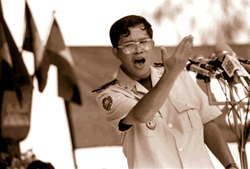Associated Press
Cambodia's prime minister on Monday said he has been unable to honor his pledge to drop defamation suits against four of his critics because the court refused to allow it.
Prime Minister Hun Sen's comments marked yet about-face in a high-profile case that has drawn international and domestic attention. Just a week ago, Hun Sen said he would drop charges against four prominent human rights activists and would tell judges and his lawyers to withdraw the suits.
But in a speech to graduate students Monday, Hun Sen said the court had replied to his request by saying it was "impossible" to withdraw the lawsuits since the activists had already been charged and legal investigations were already under way.
"Suspension is possible only if the case has not yet entered its investigation phase," Hun Sen said. "So neither suspension nor withdrawal (of the cases) is possible."
The four — radio journalist Mom Sonando, union leader Rong Chhun and human rights activists Kem Sokha and Pa Nguon Tieng — had been set to stand trial over their alleged criticism of a border demarcation pact Hun Sen signed with Vietnam in October.
Hun Sen began defamation proceedings against them — and several other people who have since fled the country to avoid arrest — after they allegedly accused him of ceding Cambodian land to Vietnam.
Domestic and international rights groups criticized the decision to prosecute the activists, which came amid a wider government crackdown on dissent. Many fear Cambodia is drifting toward dictatorship under Hun Sen, a one-time Khmer Rouge commander who came into power three years ago.
In a concession to critics, Hun Sen agreed earlier this month to order the four released from prison on bail pending trial. Then, last week he said he would drop the suits entirely after the activists had written thank you letters to him for being released on bail.
The decision to drop the lawsuits drew praise from U.S. Ambassador to Cambodia Joseph Mussomeli, who said last week: "We are very happy with what has happened. It's something the international community should applaud."
After the murderous Khmer Rouge years, and the 1980s under a communist regime installed by neighboring Vietnam, a 1993 election offered the hope for democracy taking root.
However, in 2003 the government banned all public demonstrations on the pretext of keeping order. Last month, a court sentenced self-exiled opposition leader Sam Rainsy to 18 months in prison for accusing Hun Sen of being behind a 1997 grenade attack on peaceful demonstrators in Phnom Penh and other allegations.


























No comments:
Post a Comment